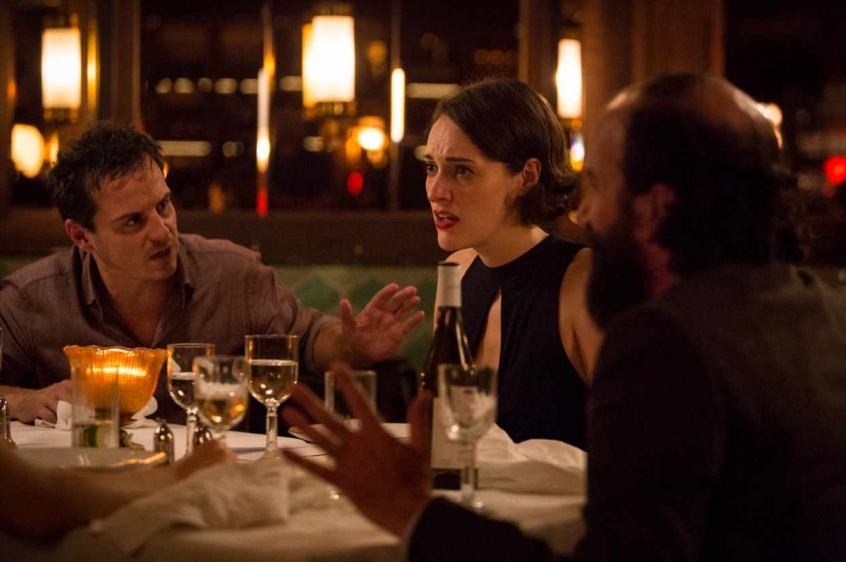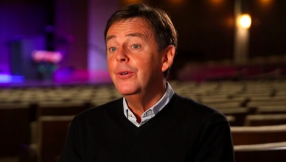
As a Catholic millennial scrolling through twitter, the last thing that you expect to see trending is 'sexy priest'. Phoebe Waller-Bridge's superb BBC Three comedy drama Fleabag has taken the UK by storm in its address of London-living, sibling-rivalry, mental health, and the moment that you fall in love with the wrong person.
Last Monday, the second series came to an almighty (excuse the pun) end with the wedding between Fleabag's father and her Godmother. In an interview on BBC Breakfast, Sian Clifford who plays Fleabag's perfectionist sister Claire revealed that there would not be a third series.
The online furore throughout this series has focused on the addition of an unnamed priest played by Andrew Scott. Famous for being Jim Moriarty in the BBC Sherlock series, nobody expected the vaguely cool, young priest image to be all to this new character. He has garnered a wide range of criticism from The Guardian, to the Church Times, and even in Vogue.
Hayley Maitland of Vogue gives her opinion: "As far as I'm concerned, there are two types of people in the world: the ones who hope that Fleabag gets together with the hot priest (and quite possibly stays a head case forever), and the ones who hope Fleabag finds some degree of catharsis and redemption through his spiritual guidance."
The reality, however, is not that simple. Looking into the wider context of the image of Catholic priesthood, Fleabag's "sexy priest" friend poses a real problem. Hannah Malcolm of The Church Times offers a third category of viewer, one that "want[s] to see some evidence that his Church has a safeguarding policy." She is not wrong.
Hannah Freeman of the Guardian adds him to a list of "hot but mean" men in pop culture. She calls him out as "an exploitative muppet in a robe" and a demonstration of manhood that we should not be endorsing. Priests, as she rightly demonstrates, are not literary characters that only behave badly in a figment of someone's imagination. Their image in the media is complex and difficult for many people.
Pope Francis' latest document, Christus Vivit, is aimed at the same target audience as Fleabag. He tells 16–30-year olds that not all priests deserve to be tarred with the same reputation. He says that "those who committed these horrible crimes are not the majority of priests, who carry out their ministry with fidelity and generosity. I ask young people to let themselves be inspired by this vast majority."
Young priests too can feel disillusioned with the institution of the Church. "No one watches Father Ted and thinks 'sign me up to the priesthood'!" one 31-year-old, skinny-jean wearing, soon-to-be-ordained Catholic priest told me.
Without his collar he looks like any other millennial man who wouldn't be out of place at your local pub quiz, as with the Fleabag priest.
"With my non-Christian friends, I used to play things cool and not go on about it," he says. Whilst studying in Rome he would aim to find commonality with his friends, such as late-night library sessions before assignments or the home comforts of the holidays.
"Do you still like music?" this young priest was recently asked. Granted, his Spotify account is niche but he assures me "that is a matter of taste, not vocation!"
But that isn't the question that people really want to ask. As Fleabag herself discerns, the notion of celibacy is not just a struggle for the lay person. Andrew Scott's priestly character blows off her question with the idea that "celibacy is a lot less complicated than romantic relationships". Without giving away any spoilers, celibacy is clearly something that he struggles with too.
The notion that a 20-something-year-old in the "prime of their life" would want to give up sex is an idea that is alien to a lot of people. But what Fleabag's priest demonstrates is that an active lifestyle decision doesn't stop a person having feelings, cravings, lapses and desires.
The capability of those things is part of how a priest can become a guide and confidant. Compare him to the therapist character, completely removed from Fleabag's pain and mixed-up life. The audience were rooting, as Maitland says, for Fleabag's catharsis to come through the welcoming, open, real and raw priest.
This is not a condoning of breaking the vows a priest makes to the Church. That (episode four) is not what a confessional is for. And believe it, this guy is going to be in a lot of trouble when his Bishop comes around. But look at it through another lens for a moment.
"Being a millennial priest is tough," says my friend. "We are a minority within a minority."
And a difficult 'them and us' pattern is clear. It is hard to ignore the raised eyebrows and whispers when a priest has a female visitor. But for the young priests I spoke to, it is exactly this character in the show that needs Andrew Scott's priest most. Fleabag walking into an almost empty church, curtailing the keen Pam (every parish has one), looking for something but not sure what.
"For some people, we might be the only people they will really talk to in a course of a week. A cup of tea and a chat might sound corny to some but for others it's a lifeline," my friend tells me.
One would have to wonder whether Fleabag would have been able to open up over a rich tea biscuit to an old man in a cassock. Fleabag's sexy priest might not be what draws young people to the Church, or not for the right reasons anyway. But at a time when the image of the priesthood is so tainted, the millennial priest is something that the Church brand could use.
Nina Mattiello Azadeh studied music and philosophy and was a Faith in Politics media intern in 2016. She has a keen interest in interfaith relations, social action and is a classical ballet dancer. Follow her on Twitter @Ninamataz













